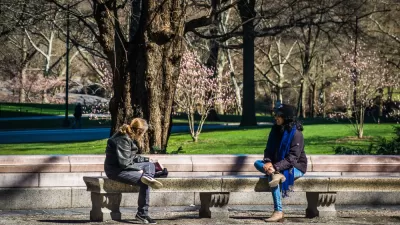Inspired by three books published in the last year that help to elucidate the role of cities and density in making people and countries richer, Ezra Klein compiles some lessons for economic development in the United States.
Klein credits recent books by authors Ed Glaeser, Ryan Avent, and Matt Yglesias for focusing on the importance of cities in America's economy, with common threads running through their related subject matter.
The three principal findings that Klein finds in these studies that deserve attention are that:
- Cities make us smarter, richer and more productive
- We have choked off access to these remarkable growth machines for too many Americans
- Anti-density policies...make it effectively impossible for Americans to live where they want
In developing solutions to the problems holding back the potential of American cities, Klein sees elements for both conservatives and liberals to like. "The means should thrill the right, as the agenda effectively boils down to deregulation. The ends should engage the left, as the people who are priced out of the cities - and thus of the benefits they bring - are the poor and the middle class, not the wealthy."
FULL STORY: The growth lesson America could take from China

Planetizen Federal Action Tracker
A weekly monitor of how Trump’s orders and actions are impacting planners and planning in America.

Restaurant Patios Were a Pandemic Win — Why Were They so Hard to Keep?
Social distancing requirements and changes in travel patterns prompted cities to pilot new uses for street and sidewalk space. Then it got complicated.

Map: Where Senate Republicans Want to Sell Your Public Lands
For public land advocates, the Senate Republicans’ proposal to sell millions of acres of public land in the West is “the biggest fight of their careers.”

Maui's Vacation Rental Debate Turns Ugly
Verbal attacks, misinformation campaigns and fistfights plague a high-stakes debate to convert thousands of vacation rentals into long-term housing.

San Francisco Suspends Traffic Calming Amidst Record Deaths
Citing “a challenging fiscal landscape,” the city will cease the program on the heels of 42 traffic deaths, including 24 pedestrians.

California Homeless Arrests, Citations Spike After Ruling
An investigation reveals that anti-homeless actions increased up to 500% after Grants Pass v. Johnson — even in cities claiming no policy change.
Urban Design for Planners 1: Software Tools
This six-course series explores essential urban design concepts using open source software and equips planners with the tools they need to participate fully in the urban design process.
Planning for Universal Design
Learn the tools for implementing Universal Design in planning regulations.
Heyer Gruel & Associates PA
JM Goldson LLC
Custer County Colorado
City of Camden Redevelopment Agency
City of Astoria
Transportation Research & Education Center (TREC) at Portland State University
Camden Redevelopment Agency
City of Claremont
Municipality of Princeton (NJ)





























